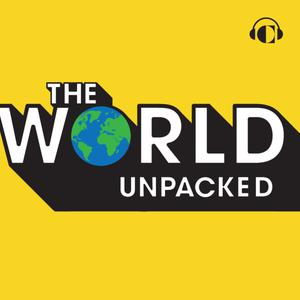
The World Unpacked
Carnegie Endowment for International Peace
The World Unpacked is a biweekly foreign policy podcast hosted by Stewart Patrick that breaks down the hottest global issues of today with experts, journalists, and policymakers who can explain what is happening, why it matters, and where we go from here. Tune in to get smart on foreign policy.
- 52 minutes 26 secondsBiden, Trump, and a Foreign Policy That’s Gone Off Course
The Biden administration contends it has left the United States in a better geopolitical position than when it entered office four years ago. In a year-end foreign policy review from Carnegie’s American Statecraft Program, Director Chris Chivvis and Senior Fellow Stephen Wertheim critique Biden's foreign policy legacy and discuss what Trump might do next.
Why has it been so difficult for Biden to restrain Israel and succeed in Ukraine? What might a Russia-Ukraine ceasefire deal look like? How can the U.S. navigate toward a more stable U.S.-China relationship, despite entrenched beliefs that we are living through a second Cold War?
Join them for a wide-ranging conversation on the most pressing issues facing the United States and the world.
Shownotes:
- The Economist, Chris Chivvis: Talks Between Russia and Ukraine would Save Lives
- Financial Times, Stephen Wertheim: It's Time for Europe's Magical Thinking on Defence to End
- The Guardian, Chris Chivvis: Admitting Ukraine to NATO Would be a mistake for both Ukraine and NATO
- Global Asia, Stephen Wertheim: Asia Should Encourage 'Trump the Peacemaker'
- Carnegie Endowment for International Peace, U.S. China Relations for the 2030s: Toward a Realistic Scenario for Coexistence
17 January 2025, 6:35 pm - 41 minutes 45 secondsNavigating the 2025 World: Advanced AI, Economic Competition, and Power Shifts
As we enter this new year of 2025, Sophia Besch sits down with President of the Carnegie Endowment for International Peace Tino Cuéllar. They take a step back at the year and look at the big themes and trends that are likely going to determine and underlie the discussions of the year ahead, from technology to political economy, democratic governance, and global power dynamics.
Notes:
- Ramachandra Guha, India After Gandhi: The History of the World's Largest Democracy, Ecco, 2008.
- James C. Scott, Seeing Like a State: How Certain Schemes to Improve the Human Condition Have Failed, Yale University Press, 1999.
- Álvaro Enrigue, You Dreamed of Empires, Riverhead Books, 2024.
16 January 2025, 10:00 am - 38 minutes 31 secondsCan the U.S. Win the Clean Energy Race Against China?
Over the past decade, China has emerged as a powerhouse here, producing the majority of key clean energy technologies. What does this mean for the United States, and for the race towards net zero emissions? In this episode, Sophia Besch and Fellow Milo McBride talk about the strategies the U.S. could deploy to better compete in the clean energy revolution. They unpack how innovative technologies could not only help close the clean energy gap with China but also redefine America’s role in the global energy landscape. They also explore how the incoming Trump administration might approach the U.S.-China race for clean energy dominance—and what all of this means for American allies abroad.
Notes:
- Milo McBride, "Catching Up or Leaping Ahead? How Energy Innovation Can Secure U.S. Industrial Stature in a Net-Zero World," Carnegie Endowment for International Peace, September 19, 2024.
- Jonas Nahm, Collaborative Advantage: Forging Green Industries in the New Global Economy (Oxford University Press, 2021).
Credits:
- Host: Sophia Besch
- Executive Producer & Audio Engineer: Heewon Park
- Videographer: Cameron Zotter
6 January 2025, 6:50 pm - 32 minutes 51 secondsWas 2024 the Year Democracy Faltered—or Fought Back?
What can the elections of 2024 tell us about the state of democracy worldwide? This year has seen a flurry of elections across democracies, sparking debate among analysts about their implications for global democratic health.
As the year draws to a close, Sophia sits down with Thomas Carothers, Director of the Democracy, Conflict, and Governance Program at Carnegie and leading expert on democracy and international politics. Their conversation unpacks key theories like the "bonfire of incumbents," and explores the narratives shaping our understanding of this pivotal election year.
- Steven Levitsky and Daniel Ziblatt, Tyranny of the Minority: Why American Democracy Reached the Breaking Point, (Crown, 2023).
- Thomas Carothers, "Three Conclusions from the Global Year of Elections," Carnegie Endowment for International Peace, December 18, 2024.
Host: Sophia Besch
Executive Producer & Audio Engineer: Heewon Park
Videographer: Cameron Zotter
19 December 2024, 10:00 am - 27 minutes 25 secondsFixing Global Trade: Why Tariffs and Trade Wars Aren’t Enough
Our modern global trading system is broken. How can we fix it?
We seem to have moved beyond the free trade consensus of the globalization era. Few politicians today still publicly support the assumption that trade, unrestricted by national borders, makes everyone more prosperous. Under President Trump, the United States has wielded tariffs and industrial policy to reshape the international trade order to better serve American interests, and the Biden administration has upheld and doubled down on many of these. But these interventions do not yet add up to a new trade policy consensus.
This week's episode dives into a provocative new argument: in order to achieve freer trade, the world needs more trade interventions. What is global trade policy doing wrong? What new trade rules are needed to create a system that both harnesses the benefits of free trade and preserves nations' freedom to direct their economies? And what policy interventions might help foster this future of freer trade? Sophia discusses these questions and more with Michael Pettis, a nonresident Senior Fellow for Carnegie China and expert on China's economy.
- Michael Pettis and Erica Hogan, "Trade Intervention for Freer Trade," Carnegie Endowment for International Peace, October 3, 2024.
5 December 2024, 10:00 am - 38 minutes 3 secondsEurope Inside Out: Is Europe Ready for Trump 2.0?
With Donald Trump returning to the White House, the future of the transatlantic alliance hangs in the balance.
Europe Inside Out's new host Rym Momtaz is joined by Sophia Besch and Christopher Shell to unpack the reasons behind his victory and its implications for EU-U.S. relations.
Original episode page on Europe Inside Out here.
21 November 2024, 10:00 am - 29 minutes 9 secondsMaritime Power Plays: The U.S. and China in the Indian Ocean
What if the future of global power dynamics and, the question of winners and losers in the US-China competition could hinge on one body of water – the Indian Ocean? As geopolitical tensions rise and great powers vie for influence in the Indo-Pacific, the Indian Ocean is emerging as an increasingly critical theater of international relations.
What is clear is that U.S.-China tensions are heightening the strategic importance of maritime security. How are these dynamics changing the geopolitical environment of the Indian Ocean? How are island nations responding to the increased interest in their regional waters, and how will they shape great power competition more broadly? Sophia Besch and nonresident scholar Darshana Baruah discuss these questions and more in this week's episode.
Notes
- C. Raja Mohan, Samudra Manthan: Sino-Indian Rivalry in the Indo-Pacific (Carnegie Endowment for International Peace, 2012).
- Darshana Baruah, The Contest for the Indian Ocean: And the Making of a New World Order (Yale University Press, 2024).
7 November 2024, 10:00 am - 49 minutes 52 secondsWill America’s Next President Bring Real Change in Foreign Policy?
Why is meaningful change in U.S. foreign policy is so difficult to achieve? This question is especially relevant with the U.S. presidential election just weeks away now, and analysts and policy makers all over the world are discussing how a Trump or Harris presidency might shift American foreign policy in the years to come.
But how likely is it that we will see meaningful change at all? Historically, it has been incredibly challenging for presidential administrations to break away from entrenched foreign policy paths —even when the need for change seems obvious. Presidencies often start with a declaration of pivots and major strategic reorientation, these then get ground down by powerful bureaucracy, political pressures and human tendency to preserve the status quo. When change does happen, leaders often pay a high political price for it. Take, for instance, the example of the withdrawal from Afghanistan. In the end, it took two decades and much internal pushback before President Biden was able to officially make this happen - even though the decision had long had significant public support.
In this week's episode, Sophia Besch sits down with Christopher Chivvis and Stephen Wertheim to discuss their research that dissects how strategic foreign policy change does happen despite pressures to maintain the status quo—and what it would take for the next American president to enact such a change.
Notes:
- Christopher S. Chivvis et al., Strategic Change in U.S. Foreign Policy, Carnegie Endowment for International Peace, September 24, 2024.
- Stephen Wertheim, "How Kamala Harris Should Put America First—for Real," New York Times, October 21, 2024.
- Christopher S. Chivvis and Stephen Wertheim, "America's Foreign Policy Inertia: How the Next President Can Make Change in a System Built to Resist It," Foreign Affairs, October 14, 2024.
- Rebecca Friedman Lissner, "Wars of Revelation: The Transformative Effects of Military Intervention on Grand Strategy," Oxford University Press, 2021.
24 October 2024, 9:00 am - 32 minutes 42 secondsCan Tunisia’s Democracy Survive Saied’s Second Term?
Following Sunday's controversial presidential election, Kais Saied has secured his second term in office. While this result was widely anticipated, it raises deeper questions about the trajectory of Tunisia's democracy. Tunisia was once seen as the shining success of the Arab Spring – a beacon of democratic hope. But now, like several of its neighbors, it finds itself grappling with rising authoritarianism, weakened institutions, and disillusioned voters.
Today, we’re not just looking at Tunisia’s election results, but also exploring what these trends tell us about the state of democracy in the wider region. How did Tunisia arrive at this point in its democratic trajectory? What does this mean for the future of political reform, governance, and stability in North Africa and beyond?
In this episode, Sophia Besch discusses these questions and more with Sarah Yerkes, a senior fellow in Carnegie’s Middle East Program and expert on Tunisia’s political and economic reforms.
Notes:
- Sarah Yerkes, "How Tunisia's President Has Used the Law to Secure His Election Victory," Carnegie Endowment for International Peace, September 24, 2024.
10 October 2024, 9:00 am - 32 minutes 14 secondsThe Geopolitics of Climate Engineering: A Climate Lifeline or Pandora’s Box?
In the fight against climate change, a controversial new idea is gaining traction: solar geoengineering. Solar geoengineering, or solar radiation modification, is an emerging technology that aims to reflect sunlight back into space to cool planet Earth. In a world that is struggling to bring about the behavioral and political changes needed to reduce climate change, an innovative tech approach might seem like an alluring silver bullet.
But the reality is not so simple. In this episode, Sophia sits down with Cynthia Scharf, a senior fellow at the International Center for Future Generations and former senior strategy director for the Carnegie Climate Governance Initiative. They discuss solar geoengineering's risks and promises, as well as its implications for geopolitics and conflict.
26 September 2024, 9:00 am - 46 minutes 17 secondsInside the U.S.-China Rivalry: Great Power Competition in the Middle East and North Africa
The Middle East and North Africa region is witnessing a fierce competition among the world’s current “great powers”—the U.S., Russia, and China. These three countries are all seeking to extend their influence in this region. But the ways they're engaging—with varying degrees of success—are as complex as the region itself.
This week on the show, Sophia digs into the data with Amr Hamzawy, a senior fellow and the director of the Carnegie Middle East Program. Trade and foreign direct investment, arms exports and military deployments – they all tell a story of shifting alliances, economic competition, and strategic maneuvering, and they raise important questions about how the US, China and Russia are shaping the future of the region.
Is American dominance in the region fading? What do Chinese and Russian spheres of influence look like? And how are the countries of the Middle East and North Africa navigating the complex web of great power competition?
12 September 2024, 9:00 am - More Episodes? Get the App
Your feedback is valuable to us. Should you encounter any bugs, glitches, lack of functionality or other problems, please email us on [email protected] or join Moon.FM Telegram Group where you can talk directly to the dev team who are happy to answer any queries.
 Foreign Policy Live
Foreign Policy Live
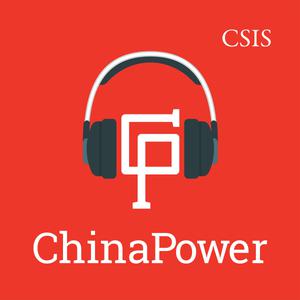 ChinaPower
ChinaPower
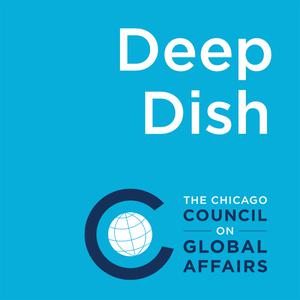 Deep Dish on Global Affairs
Deep Dish on Global Affairs
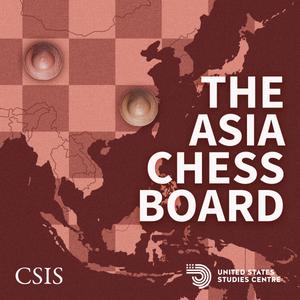 The Asia Chessboard
The Asia Chessboard
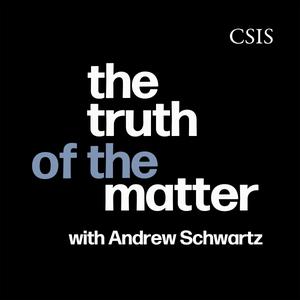 The Truth of the Matter
The Truth of the Matter
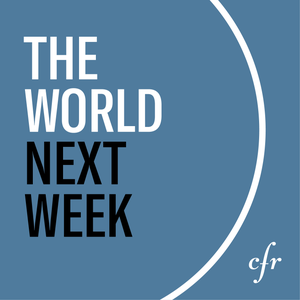 The World Next Week
The World Next Week